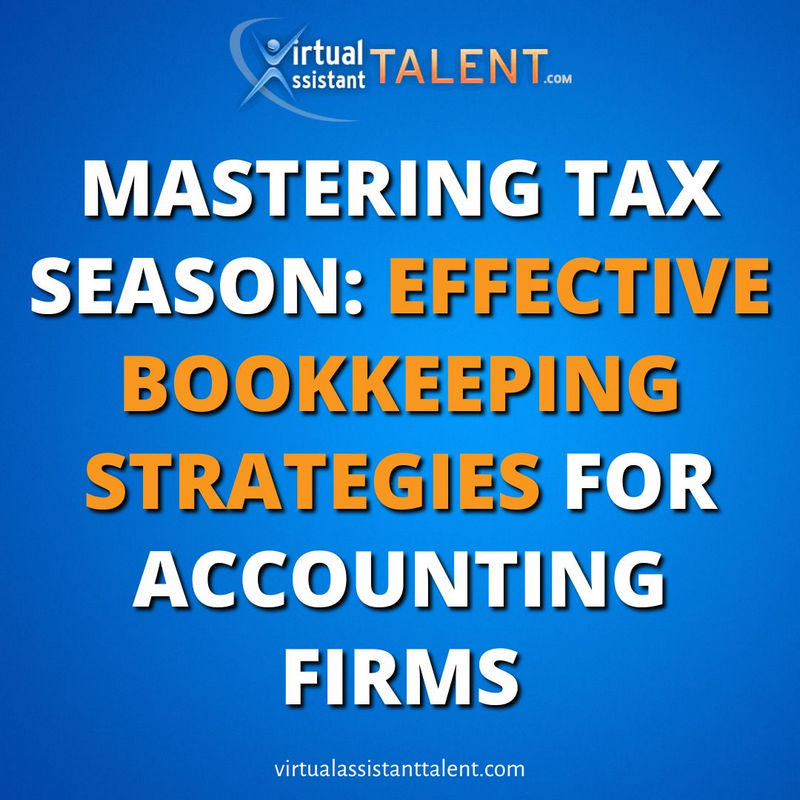
When is the tax season in the US?
How should you prepare for tax season?
Make use of technology
Maintain organized books
Regularly reconcile accounts
Update yourself with the latest amendments or changes in tax laws
Gear up for quarterly taxes
Communicate effectively with your clients
Provide value-added services
Conduct post-tax season reviews
Why should you outsource bookkeeping during tax season?
Tax season is critical for accounting firms, requiring precision and efficiency in bookkeeping practices.
As the deadline looms, accountants and bookkeepers must employ effective strategies to navigate the complexities of tax preparation.
In this blog post, we’ll explore essential bookkeeping strategies to help accounting firms streamline their processes and ensure a successful tax season.
When is the tax season in the US?
Tax season is the period between January 1st and April 15th of each year when taxpayers prepare to report their taxable income for the previous year.
On the other hand, the term “fiscal year-end” refers to the final day of a 12-month accounting period. It is used to generate annual financial reports.
Tax day in the United States is typically April 15th. However, this applies unless it falls on a weekend, so the deadline is moved to the following Monday.
Submitting tax returns after the deadline will result in late penalty fees and interest charges. Although extensions are available, they only delay the paperwork filing and do not affect the payment of any taxes owed.
The upcoming tax season will begin on January 1st, 2024, and the filing deadline is Monday, April 15th, 2024.
How should you prepare for tax season?
Make use of technology
We cannot stress enough how advantageous leveraging technology is as you prepare for this tax season—amplifying your efficiency in bookkeeping during tax season.
You can also use artificial intelligence, accounting software, and cloud-based platforms to streamline data entry, reconciliation, and financial reporting. These tools automate repetitive tasks, minimize errors, and provide real-time insights into your clients’ financial health.
Maintain organized books
Organized record-keeping is fundamental to effective bookkeeping and tax preparation.
Establish a systematic approach to categorizing and storing financial documents, such as income statements, expense receipts, and bank statements.
When you organize your accounts regularly, you simplify the process of retrieving the needed information and ensure accuracy in tax reporting.
Regularly reconcile accounts
Regular reconciliations of bank accounts, credit cards, and other financial accounts are crucial during tax season. This process helps identify discrepancies and ensures that all transactions are accurately recorded.
Maintain a schedule so you can do regular reconciliations as you go. This strategy helps you stay on top of your client’s financial data and avoid last-minute surprises.
Update yourself with the latest amendments or changes in tax laws
Tax laws and regulations are ever-changing, making it essential for accounting firms to stay informed and up-to-date.
Subscribe to reputable tax news sources, attend professional development seminars, and consult with tax experts to understand the latest changes and how they may impact your clients’ tax obligations.
Continuous professional development should be constitutive of your internal process. A well-informed team can handle the fast-paced environment and stay on top of things amidst the changes in taxation laws and technological advancements.
In addition, you should also be able to adapt quickly—a hallmark of successful tax planning and preparation. This allows you to provide top-notch service to your clients and eventually turn them into avid customers.
Gear up for quarterly taxes
For clients who are self-employed or business owners, planning for quarterly tax payments is crucial.
Help them estimate their tax liabilities and set aside funds regularly to meet these obligations. By proactively managing quarterly taxes, you can prevent financial strain and minimize the risk of penalties.
Communicate effectively with your clients
Effective communication is critical to successful tax season collaboration between accounting firms and their clients.
Keep clients informed about important deadlines, required documentation, and any changes in tax laws that may affect them.
Clear and timely communication fosters trust and ensures that both parties are aligned throughout the tax preparation process.
Provide value-added services
Tax season presents an opportunity for accounting firms to offer value-added services beyond traditional bookkeeping.
Provide tax planning advice, identify potential tax-saving opportunities, and offer strategic financial guidance to help clients optimize their tax positions. These additional services demonstrate your firm’s expertise and commitment to client success.
Conduct post-tax season reviews
Once tax season has concluded, take the time to conduct a thorough review of your firm’s bookkeeping processes and performance.
You can start by identifying improvement areas, gathering client feedback, and implementing changes to enhance efficiency and effectiveness for future tax seasons. Continuous evaluation and adaptation are essential to ongoing success in tax preparation.
Why should you outsource bookkeeping during tax season?
Tax season is hectic no matter what year it might be, so accounting firms can reap numerous advantages by outsourcing their tax preparation services.
Opting for outsourcing allows firms to concentrate on their core strengths while delegating routine tasks to specialized professionals.
The cost-effectiveness of outsourcing can lead to a considerable improvement in the firm’s profitability, enabling it to allocate resources towards more strategic initiatives and customer-centric activities.
For bookkeeping services, you can always hire a bookkeeping virtual assistant from reputable agencies, such as Virtual Assistant Talent. We are a Better Business Bureau-accredited company. We’ve been keeping clients happy in various industries, be it accounting, insurance, or other financial and marketing industries.
Final Thoughts
In conclusion, mastering tax season requires combining technology, organization, knowledge, and proactive communication.
By implementing these effective bookkeeping strategies, accounting firms can create smooth-running processes, minimize errors, and deliver exceptional service to their clients during this critical time of year.
At Virtual Assistant Talent, we offer customized solutions to enhance your efficiency and ease your load during this busy time of year.
Our seasoned and skilled professional bookkeeping virtual assistants can handle various tax preparations.
Moreover, they are well-versed in using cloud accounting software such as Microsoft Money, Quickbooks, Peach Tree, and Quicken.
To know more about our services, call us at +1-866-596-9041.
Resources:
https://www.entigrity.com/resources.blogs-and-insights/tax-planning-strategies-for-accounting-firms
https://finsmartaccounting.com/tax-bookkeeping-planning-strategies/
https://dccaccounting.com/blog/accounting/6-tips-to-get-your-bookkeeping-ready-for-tax-season .

